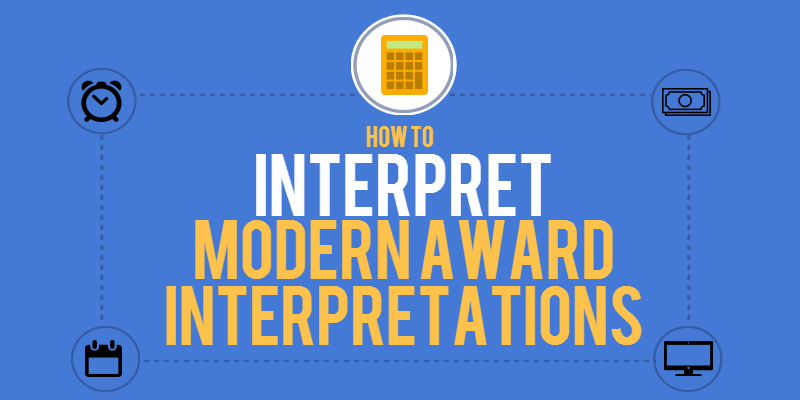
How to Interpret Modern Award Interpretations
The phrase ‘award interpretations’ perplexes many, and is enough to send a shiver down the spine of many hard-working professionals. Australia has a complex awards system, which can wreak havoc on even the most experienced businesses. The fact of the matter is that ensuring every employee within your company is being paid in compliance with current awards is very difficult – especially considering how fast-changing and multi-facetted Australia’s awards structure is. As confusing as they can be to get your head around, having a solid understanding of awards and their repercussions is essential for the well-being of your business.
What are ‘modern awards’?
Modern Awards are defined by the Fair Work Ombudsmen as the “legal documents that outline the minimum pay rates and conditions of employment” as updated in 2009. Modern awards operate on an industry and occupation level in order to provide a kind of safety net for employees. In Australia, there are 122 different awards across various industries. Companies must either comply with the relevant award, or a registered enterprise agreement. For example, if you work in a store, you’re probably covered by the General Retail Industry Award 2010, and if you work at a food chain your award is the Hospitality Industry (General) Award 2010.
How do I interpret them correctly?
To ‘interpret’ a modern award correctly, you essentially must comply with all the requirements of the relevant industry award as set by Fair Work. On average, there are around 30 separate clauses to each award, with additional schedules. As previously explained, the specific details of each of the 122 separate awards vary, but there are some basic requirements of each.
Each award is divided into five parts. They are application and operation, consultation and dispute resolution, types of employment and termination of employment, classification and minimum wage rates, and hours of work and related matters.
Employees’ remuneration will change based on their age, status as casual, part-time or full-time, and depending on if they are a trainee or apprentice. Then there are changes based on time of day (evening work is often remunerated higher), penalty rates for weekends and public holidays, as well as overtime. Tax deductions and superannuation must be factored in too. Rostering is another factor, with certain requirements for minimum and maximum shifts, gaps between shifts, and notice of shifts. Accrued, sick, annual and carer leave are also features of most awards, as are accident pay and various allowances (uniform, travel).
There is a lot to cover, and often you will be dealing with a complicated mix of employees – some casual, part-time, or full-time working different hours and requiring different leave, overtime, and penalty rates. Hence, making a mistake in terms of compliance is very easy. And mistakes are happening all the time – according to the Australian Payroll Association’s 2017 Payroll Benchmarking Report, Australia’s top employers make payroll errors exceeding $4.4 million each year.
Costs associated with incorrect interpretations
- Fair Work penalties
Unfortunately, even minor mistakes in the payroll process can result in large financial penalties. Companies can face fines up to $51,000, and individuals up to $10,200 per each breach of award. If the Fair Work Ombudsman decides to take you to court, you will be losing time – and hence money – in court, and you may even need to pay a lawyer. - Large payouts
- The Fair Work Ombudsman will require any underpayments to be rectified. This means losing a usually large lump-sum of money to be remunerated to any employee that was paid below the award. Last year, one company had to pay a massive $460,000 back to employees.
- Tarnished company reputation and brand
- The media loves a good story of a company “ripping off” its employees. Even if your award non-compliance was all an innocent mistake, it’s bait for bad publicity, and tarnishes your company’s reputability. Grill’d, 7-Eleven and George Calombaris’ hospitality company have all suffered major brand damage due to such non-compliance.
- Lowering of workplace morale
- Not providing employees the correct remuneration for their efforts, or breaks and leave, will leave them unsure about how invested you are in them and their wellbeing. This will undoubtedly lower employee levels of satisfaction with your company, and they won’t likely be doing their best work in these conditions.
Ensuring that your company is complying with modern awards is mission-critical. Non-compliance is easy to achieve, and is expensive, time-consuming, bad for publicity, and will lower workplace morale. Many companies are likely just one audit away from hefty fines and large backpays. The best way to avoid all of these dramas is to outsource your payroll to a reliable company, whose core role it is to stay up-to-date with modern awards as they change and adapt. Roubler provides award interpretation for modern awards, backed by a fully integrated and managed payroll platform, giving you peace of mind around compliance. If you would like to find out how we can assist, please get in touch.
Read our payroll EBook for more information on award interpretations.